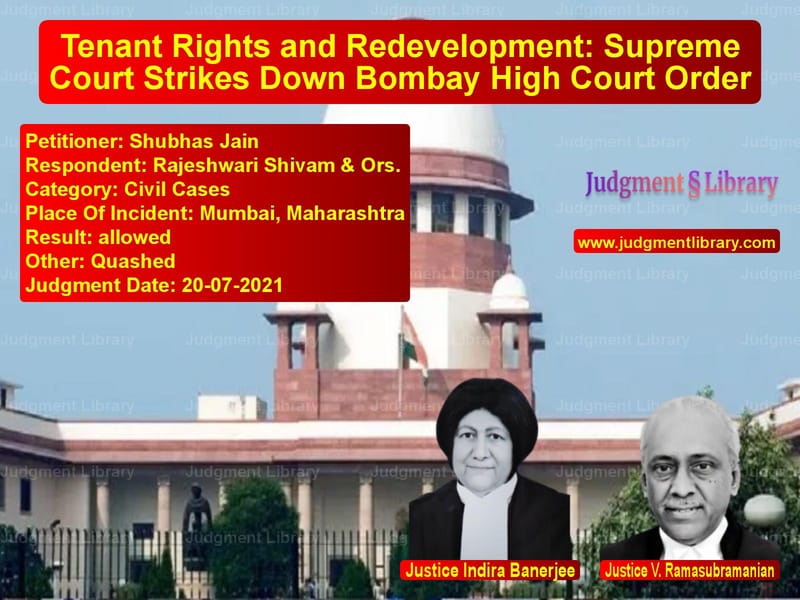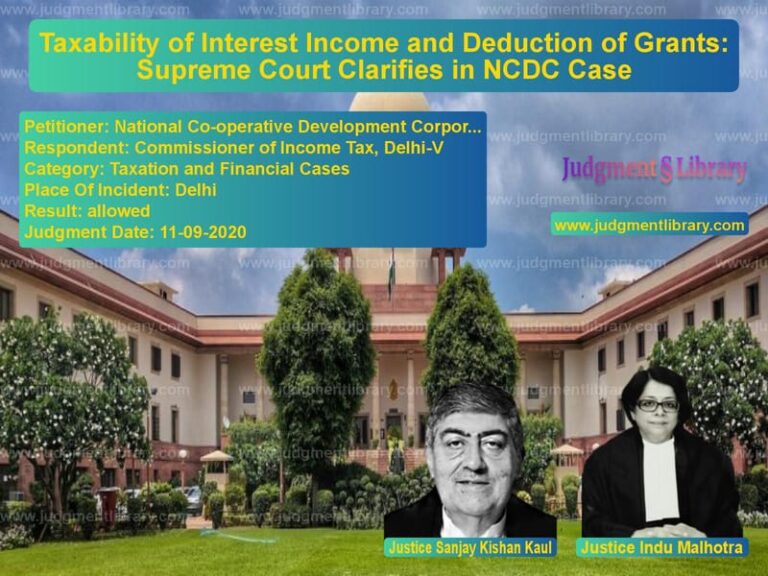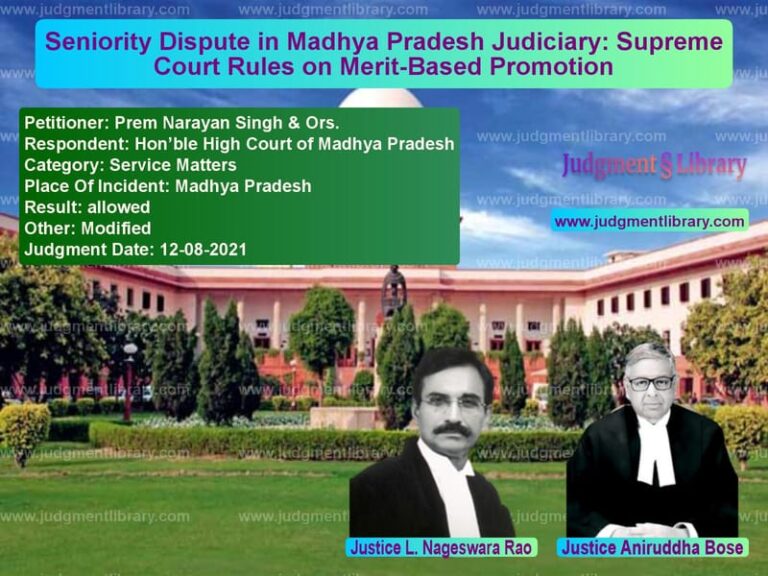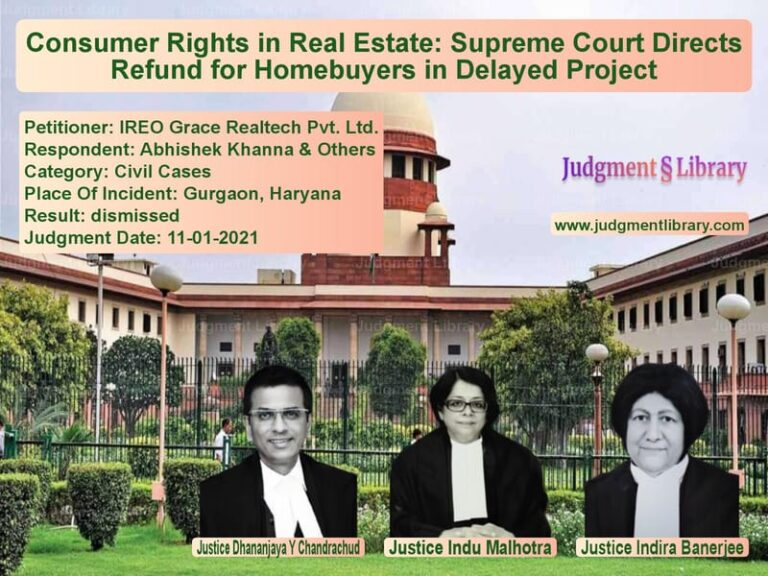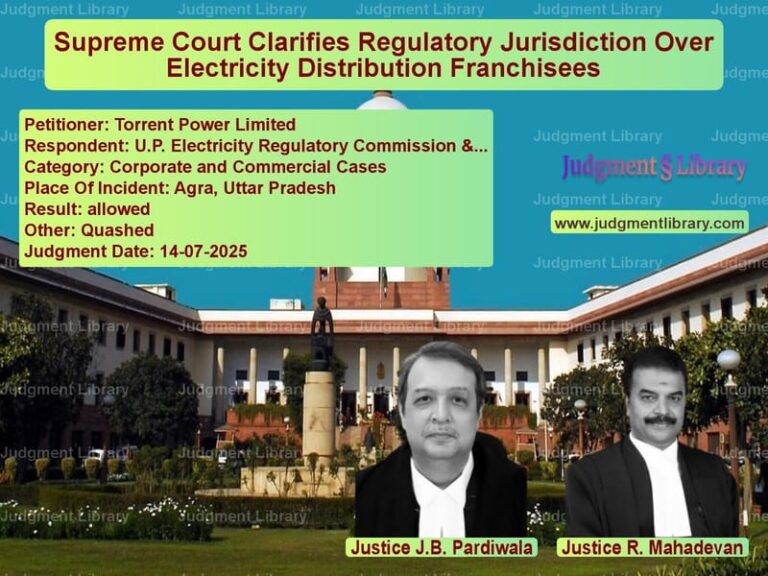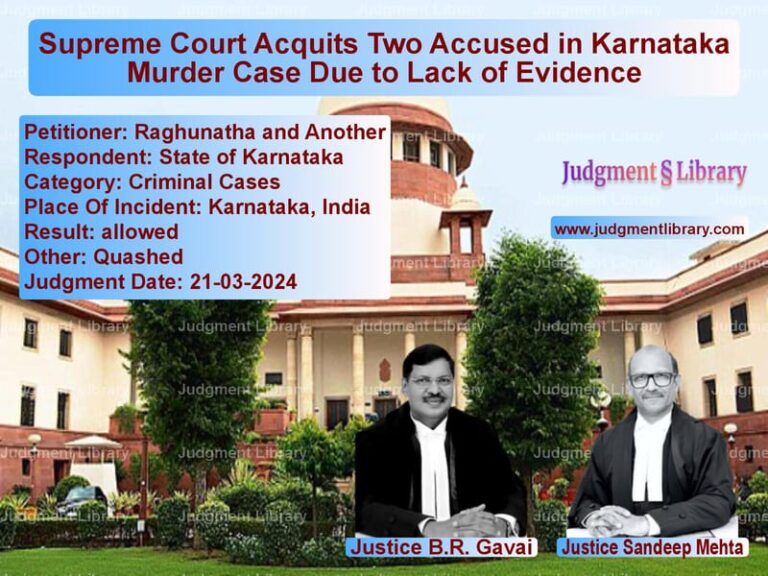Tenant Rights and Redevelopment: Supreme Court Strikes Down Bombay High Court Order
The Supreme Court of India delivered a significant judgment on 20th July 2021 in the case of Shubhas Jain v. Rajeshwari Shivam & Ors.. The ruling addressed a dispute concerning the redevelopment of a property in Mumbai and the eviction of tenants residing in a dilapidated building. The case brought into question the legal standing of tenants in redevelopment projects and the limits of judicial intervention in municipal decisions.
The judgment, delivered by Indira Banerjee and V. Ramasubramanian, overturned a Bombay High Court order that had permitted a tenant to conduct structural modifications on a property despite municipal authorities declaring the building as unsafe. The Supreme Court emphasized that such interventions must be based on expert opinions and lawful procedures rather than individual tenant claims.
Background of the Case
The dispute arose over a property located at Vishram (Mahavir) Baug Compound, Chembur, Mumbai. The appellant, Shubhas Jain, was the owner of the structure, which was constructed in 1930. The premises consisted of three interconnected buildings, which housed 24 tenants, including the respondent, Rajeshwari Shivam.
Read also: https://judgmentlibrary.com/ex-parte-decree-and-guardian-appointment-supreme-courts-landmark-ruling/
The dispute began when the Municipal Corporation classified the building under the C-1 category, indicating that it was in a dangerous and uninhabitable condition and required immediate demolition. The categorization was based on multiple structural audit reports, which concluded that the building was beyond repair.
Legal Issues Before the Court
- Whether the Bombay High Court was justified in allowing the respondent to modify the structure despite municipal authorities declaring it unsafe.
- Whether a tenant can challenge a municipal notice of demolition under Section 354 of the Mumbai Municipal Corporation Act.
- Whether the Municipal Corporation’s findings regarding the building’s safety should be subject to judicial review.
Arguments by the Appellant
The appellant, represented by Dilip Annasaheb Taur, argued:
- The structure was over 90 years old and had been classified as a dangerous building requiring immediate evacuation.
- Out of 24 tenants, 18 had already vacated the premises after reaching a settlement with the owner.
- The tenant’s reliance on an independent structural report was flawed since municipal authorities had already declared the building unfit for habitation.
- The Bombay High Court erred in granting permission to conduct repairs without considering the structural integrity of the entire interconnected building.
Arguments by the Respondent
The respondent, represented by Preteesh Kapur, countered:
- The building could be salvaged through repairs and did not require complete demolition.
- The owner was using the C-1 classification as a pretext to evict tenants without providing them with alternative accommodation.
- A report by M/s. Shetgiri and Associates indicated that the building could be repaired and made habitable for another 5-6 years.
- The tenant had a vested right in continuing possession and should not be forced to vacate based on a unilateral decision of the municipal authorities.
Supreme Court’s Observations
The Supreme Court made the following key observations:
- Municipal Authorities’ Decision Prevails: The Court emphasized that technical assessments by municipal authorities should not be overridden by tenant claims.
- Conflicting Reports: The Court found that the report relied upon by the respondent was inconclusive, as it itself recommended immediate repairs to prevent structural failure.
- Judicial Overreach: The Supreme Court noted that the Bombay High Court exceeded its jurisdiction by permitting the tenant to carry out modifications without considering municipal regulations.
- Impact on Redevelopment: The ruling reinforced the right of property owners to initiate redevelopment when municipal authorities classify a building as uninhabitable.
Final Verdict
The Supreme Court set aside the Bombay High Court’s order and ruled in favor of the property owner, stating:
- The respondent had no right to prevent the redevelopment of the property once municipal authorities deemed it unsafe.
- The tenant’s claim that repairs could extend the life of the building was not legally sustainable.
- The Municipal Corporation’s classification of the building as C-1 was binding and should not have been interfered with.
The Court further noted that the owner had offered the tenant an alternative settlement, which included:
- Provision of equivalent accommodation in the redeveloped building.
- Payment of monthly rent of Rs. 18 per sq. ft. until completion of the redevelopment.
- An advance payment of 11 months’ rent and a Rs. 2,000 moving allowance.
Impact of the Judgment
This ruling has significant implications for urban redevelopment and tenant rights in India:
- Affirms Municipal Authority: The decision reinforces the binding nature of municipal findings in matters of structural safety.
- Protects Redevelopment Projects: The ruling prevents tenants from delaying redevelopment projects through legal challenges based on private reports.
- Clarifies Tenant Rights: The judgment establishes that while tenants have rights, they cannot impede redevelopment once safety concerns are established.
Conclusion
The Supreme Court’s decision in Shubhas Jain v. Rajeshwari Shivam & Ors. is a crucial precedent in urban redevelopment. It ensures that municipal assessments of structural safety are given due weight and prevents tenants from obstructing redevelopment efforts through prolonged litigation. The ruling balances property rights with tenant protection, ensuring that redevelopment occurs lawfully and safely.
Petitioner Name: Shubhas Jain.Respondent Name: Rajeshwari Shivam & Ors..Judgment By: Justice Indira Banerjee, Justice V. Ramasubramanian.Place Of Incident: Mumbai, Maharashtra.Judgment Date: 20-07-2021.
Don’t miss out on the full details! Download the complete judgment in PDF format below and gain valuable insights instantly!
Download Judgment: shubhas-jain-vs-rajeshwari-shivam-&-supreme-court-of-india-judgment-dated-20-07-2021.pdf
Directly Download Judgment: Directly download this Judgment
See all petitions in Property Disputes
See all petitions in Landlord-Tenant Disputes
See all petitions in Specific Performance
See all petitions in Judgment by Indira Banerjee
See all petitions in Judgment by V. Ramasubramanian
See all petitions in allowed
See all petitions in Quashed
See all petitions in supreme court of India judgments July 2021
See all petitions in 2021 judgments
See all posts in Civil Cases Category
See all allowed petitions in Civil Cases Category
See all Dismissed petitions in Civil Cases Category
See all partially allowed petitions in Civil Cases Category

